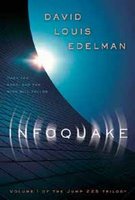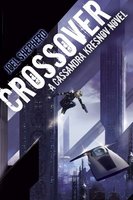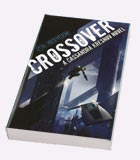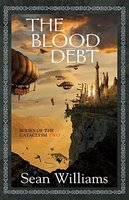Melty Men – Jack Dann, William Gibson, and the Man Who Melted
The new issue of SFRevu is up, and with it, a really fascinating piece on Jack Dann’s The Man Who Melted.
Who Melted. We’re reissuing this classic 1984 novel this month, but Ernest Lilley notes that the original four stories from which the novel sprung place its genesis as just prior to William Gibson’s landmark cyberpunk work Neuromancer
(to which it lost the Nebula Award). Liley goes on to compare and contrast the two novels, with the conclusion that they were operating almost in parallel within the zeitgeist of the times. He contrast the novels’ respective protagonists thusly:
“Now, while Case is unable to access the net because his synapses have been hacked as the result of his double crossing his employers. Raymond’s plight is that he can’t remember his wife, the memory of whom was washed from his brain during the Great Scream, and outburst of psychotic humans who channel a shared reality telepathically with those around them. Ray is desperate to find his lost memories, if not his wife, and even willing to plug into a dying screamer to experience the connection with every one in that web of consciousness. Take away the mystical parts and it gets very web-like, including high tech devices to connect your mind to the web.”
Lilley praises Dann for being prescient a few times over, and concludes by saying:
“Both stories are set around singularity events, though couched in different terms. For Gibson it’s the accepted (now, anyway) notion of AIs taking things over, or vying for supremacy, while Dann’s world takes the idea of a spiritual reservoir that we can use technology to access which threatens to pull us all across it’s threshold into a state of common consciousness. When those two views were originally put forth, they may have seemed radically different, but if you consider the vast amount of thought on uploading virtual selves into cyberspace, the differences become less definite. It’s often been stated that Neuromancer laid out the template for the internet and Gibson’s work had tremendous impact on the forming of cyberspace. That’s no doubt true, but no less so than that The Man Who Melted shows us what we’ll find a the end of the information superhighway, and that the real challenge isn’t creating technology, but using it to explore our humanity.”
 Meanwhile over on SF Reviews, Thomas M. Wagner takes the occassion of our Jack Dann reissue – “this company is hot and getting hotter” – to recall his memories of the original work and revisit the novel anew:
Meanwhile over on SF Reviews, Thomas M. Wagner takes the occassion of our Jack Dann reissue – “this company is hot and getting hotter” – to recall his memories of the original work and revisit the novel anew:
“I can only say it’s high time this little rarity had a chance to find a new audience. It isn’t for every audience. It challenges you, not by spinning a convoluted plot or trading in philosophical obscurity, but by the way it flenses the emotions from human experience and lays our most private places bare. It’s an absorbing but often painful trek into the “dark spaces” we conceal from ourselves and those we love. It’s unlike anything else in the genre. Adventurous readers hankering for incisive, character-driven literary SF will find much to admire and reflect upon.”
Melty Men – Jack Dann, William Gibson, and the Man Who Melted Read More »








